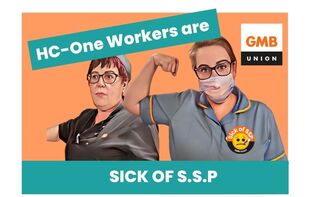-
Demand the billionaire breakup of Wilts health services is paused!On 1 April, a huge portion of Wiltshire's health services (including 2,000 NHS trained staff) will be given away to a billionaire private equity investment firm, Twenty20 Capital. This unprecedented transfer risks patient care, the breakup and disruption of services and the driving down of health workers pay and conditions. The local Integrated Care Board, who awarded the contract to private healthcare firm HCRG (owned by billionaire private equity investment firm Twenty20 Capital) in October, did so quickly, quietly and without meeting several of their legal obligations. Please join us urgently in asking the relevant councils to formally request the Secretary of State pause this transfer to enable proper scrutiny and accountability to take place and avoid disruption to the public health service. Organised by: UNISON Southwest and Protect Our NHS4,457 of 5,000 Signatures
-
Save ScotRail's Ticket Offices• Without ticket office staff we will no longer be able to secure the best fare for our journeys. • Unstaffed stations increase the risks of anti-social behaviour, and jeopardise the safety of women and vulnerable passengers. • Closing ticket offices early removes the support many people need, particularly those with disabilities or learning challenges. • Ticket vending machines are confusing, especially for older passengers, and many people do not have smart phones. • At a time of climate crisis we need more people to use the railways. Reducing ticket office opening hours will make rail travel less appealing.780 of 800 SignaturesCreated by TSSA Scotland

-
Get Me Home Safely Norwich.The council CAN and SHOULD use it's powers around late night licensing criteria to ensure Hospitality venues provide free transport for late night and anti-social hours workers. The council must also call for improved late night transport provision, minimum standards for taxi and private hire safety and stronger enforcement of harassment on public transport. 16 UK councils have agreed to support the campaign- let's make Norwich safe too!151 of 200 SignaturesCreated by Lily Pawsey
-
Lancashire County Council: Regrade and Recognition Now!Over time we have seen a substantial change in our job role. The cases we handle are far more complex and challenging as services user needs have changed. We are now handling cases that can include severe mental health, neglect, abuse, exploitation and other situations which previously were exclusively dealt with by Social Workers. Lancashire County Council found the majority of Social Care Support Officers to be working at a higher grade, but our regrading did not result in our grade increasing. The service will simply not survive if skilled and dedicated workers are forced to leave because of low pay and lack of recognition for our work.1,093 of 2,000 SignaturesCreated by UNISON North West

-
Return our Kids to Churchill Community College and Call on the DFE to fix our SchoolSchool days were the best days of your life but for these kids it has been stop, start and then move school. They need and education they deserve. They need to enjoy school and be around there peers. This can only be possible if mobile building are on site allowing them to be in their own school grounds The Department for Education must foot the bill for the repairs. Council receives approx £3million for school budgets, to rebuild a school like Churchill Community College will cost approx £25million plus another 3 schools in the borough also need repairing. This will almost inevitably impact on our children in the future as Council and school budgets are all at breaking point.301 of 400 SignaturesCreated by Craig Thompson
-
Sick of Statutory Sick Pay!We need company sick pay for the protection of our residents and our colleagues. We need company sick pay to give us the time to get better when we are ill. We need company sick pay to protect us financially.908 of 1,000 SignaturesCreated by GMB Care Sector
-
Northants PFCC must goThe position of a PFCC should be held by someone with integrity and who can make competent and professional decisions. The current PFCC is not that person. The PFCC is the governance of one of the most trusted and reliable workforces in the public’s time of need. The fire service, firefighters, and the public deserve better.770 of 800 SignaturesCreated by FBU Northamptonshire
-
Stop Direct Entry in to Oxfordshire Fire & Rescue ServiceIt's vital to maintain the Health, Safety and Welfare of firefighters, not reduce opportunity for progression and also to ensure that the service has competence and confidence at vital roles across all management levels from Crew - Brigade Management.1,162 of 2,000 SignaturesCreated by FBU Oxfordshire
-
Urgent support for rail cleaners, security guards and other outsourced workersThousands of cleaners work on our railways, cleaning trains and stations for Train Operating Companies, Network Rail, TfL and London Underground. These cleaners worked throughout the pandemic and continue to work today to keep our rail services clean and safe. The are joined by security guards, gateline staff and many other essential roles. The vast majority of these workers are outsourced to sub-contractors meaning that they have lower pay, no access to sick pay and pensions and are barred from the same free and discounted travel facilities that are given to many other rail workers. The cost of living crisis has hit these low paid workers hard. Yet the directors of rail companies, whose pay is magnitudes greater than that of cleaners, do receive free travel. The Mayor of London Sadiq Khan has recognised the cost of living crisis and has given travel facilities to all outsourced cleaners working for TfL and London Underground, also agreeing to explore bringing cleaning in-house on the Tube. It is time that the Secretary of State followed this example, providing free travel for rail cleaners and other outsourced workers and reviewing their outsourcing contracts with a view to bringing them into direct employment.4,553 of 5,000 SignaturesCreated by RMT Union

-
Support the 13th Note workers!For too long hospitality workers have been subject to abusive, hyper-exploitative, unsafe and insecure working conditions. Workers at the 13th Note, represented by Unite Hospitality, are part of a sector-wide upsurge in union activity to tackle these problems and achieve decent and dignified jobs. We stand with our friends in other unions, such as the IWW, who also play a crucial role in organising our sector, seen recently in the Saramago dispute. We struggle not solely for ourselves but for the survival of the arts, cultural and live music scenes which are facilitated by our labour. Hospitality is a key component of social life in this country and we deserve to be properly compensated for our role in that.5,819 of 6,000 SignaturesCreated by the 13th Note Workers
-
Keep public transport link active to East Midlands AirportLets help those that use the bus as a lifeline, lets keep on track with climate change , join this campaign and lets get this sorted !254 of 300 SignaturesCreated by Nathan keightley
-
Keep Offshore Workers Safe at SeaThe UK should not be reliant upon authorities in Liberia, Panama or Antigua if an incident or death occurs whilst working in or transiting from the UK offshore energy sector. Offshore energy workers and seafarers should be afforded the same level of protection as land based workers in the UK and the regulatory gaps should be closed.1,529 of 2,000 SignaturesCreated by Jonathan Havard




.jpg)





